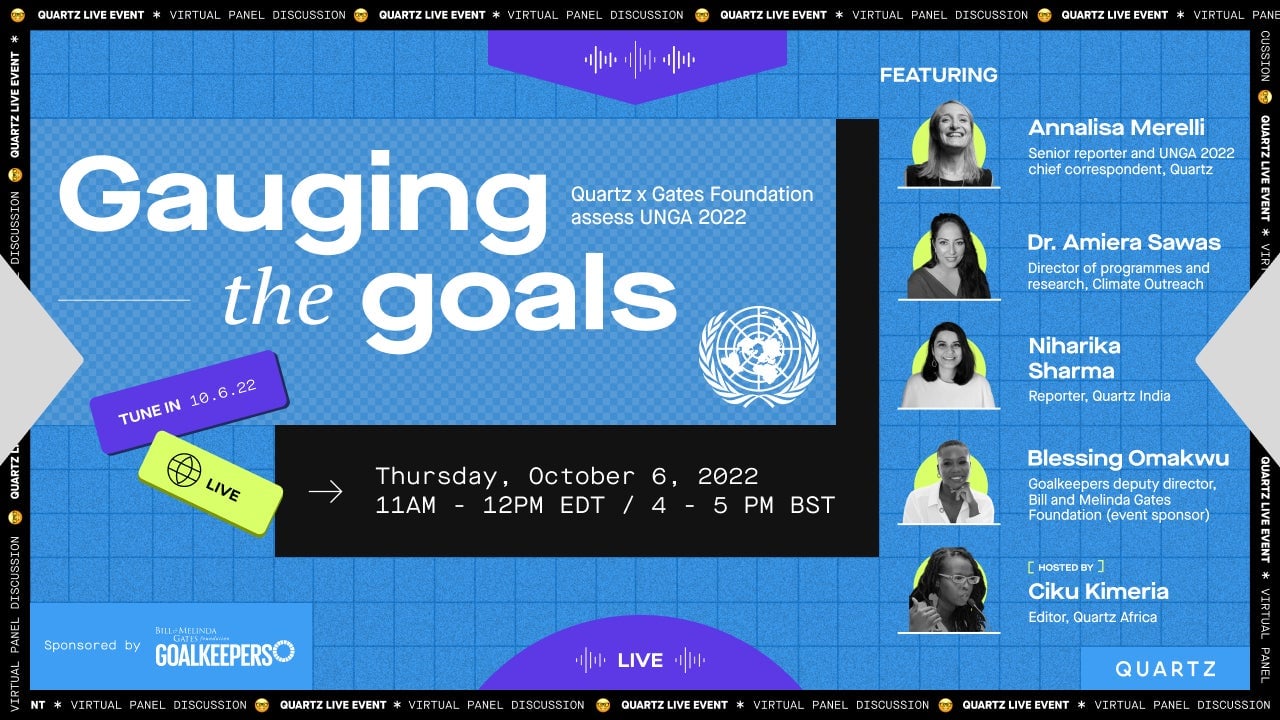🌎 Zelle has a fraud problem
Plus: What to expect from the OPEC+ meeting

Good morning, Quartz readers!
Here’s what you need to know
US banks are failing users of their peer-to-peer payment system Zelle. A report led by senator Elizabeth Warren showed victims of fraud often don’t get compensation.
Donald Trump sued CNN for defamation. The former president is seeking $475 million in punitive damages.
A UN agency called on central banks to halt their interest rates hikes. The United Nations Conference on Trade and Development encouraged policymakers to use other tools to control inflation.
Quantum mechanics was the focus of the 2022 Nobel Prize in Physics. France’s Alain Aspect, US’s John F. Clauser, and Austria’s Anton Zeilinger were recognized for pioneering quantum information science.
Kim Kardashian agreed to pay a $1.26 million fine for promoting EthereumMax… The billionaire endorsed a little known cryptocurrency on her Instagram account without proper disclosures.
…as US regulators called for new legislation to regulate cryptocurrencies. An interagency group suggested Congress should focus on stablecoins, digital assets pegged on the value of other assets like commodities and currencies.
What to watch for
The Organization of the Petroleum Exporting Countries Plus (OPEC+), a cartel of 23 oil-producing countries, will discuss tightening output by more than 1 million barrels per day (bpd) at its Oct. 5 meeting in Vienna.
The last time OPEC+ agreed to a drastic production cut was in 2020, when the covid pandemic was crippling demand. Since then, the cartel has been raising output bit by bit.

Last month, as recession fears pushed oil prices down, OPEC+ agreed to cut production by 100,000 bpd. It wasn’t enough to make an actual impact—JPMorgan Chase estimates the output needs to be lowered by at least 500,000 bpd to stabilize prices.
Russia was reportedly one of the main proponents of the drastic cut. The country would benefit from a spike in prices to soften the blow of a EU embargo on Russian oil imports set to take effect on Dec. 5.
Who owns AI-generated art?
The use of artificial intelligence systems like DALL-E 2 and Midjourney, which take a string of descriptive prompts to generate sometimes fantastical, often quirky art, is only set to grow with OpenAI, the company behind DALL-E, dropping its invitation-only barrier.
Spoiler: Not even AI generator sites agree on this. And how different stock image sites like Getty Images and Shutterstock treat AI-generated pictures is no less variable. Until guidelines are standardized, questions around ownership will continue to envelop the technology, making it only more contentious as it finds its way into animated films and art contests.
Gauging the UN’s sustainability goals

With this year’s UN General Assembly now in the rearview mirror, we’ll look back on what was accomplished, and what remains a wishful commitment. Did the delegates move the needle on human rights or sustainability efforts? Did they revive interest in multilateralism as a means for solving urgent problems? Join a virtual panel of Quartz journalists and special guests as we review the impact and implications of UNGA 2022.
Surprising discoveries
Two walleye contest cheats got caught. One team vying for the $30,000 prize tried to be clever, but the judges knew something was fishy.
Historic media of the Beatles was uncovered. Fans can now get a look at the band in 1961, before they debuted, and a video of them visiting Japan in 1966.
Sue the T-rex is stumping paleontologists. The dinosaur’s fossilized skull contains eight holes, but no one knows why.
Russia’s Lego stores are now called “World of Cubes.” Plans are to open 65 shops across 20 cities in the country by the end of October.
A Chinese vase sold for almost 4,000 times its value. A fierce bidding war drove up the price from €2,000 ($1,963) to €7.7 million ($7.56 million).
Our best wishes for a productive day. Send any news, comments, weighty walleyes, and overpriced vases to [email protected]. Reader support makes Quartz available to all—become a member. Today’s Daily Brief was brought to you by Sofia Lotto Persio, Julia Malleck, Ananya Bhattacharya, and Morgan Haefner.
Correction: Yesterday’s email incorrectly said this month’s OPEC+ meeting is scheduled for Oct. 6. It will take place instead on Oct. 5.